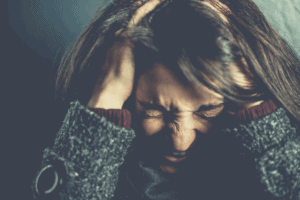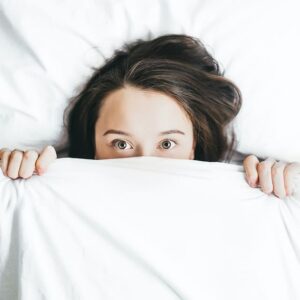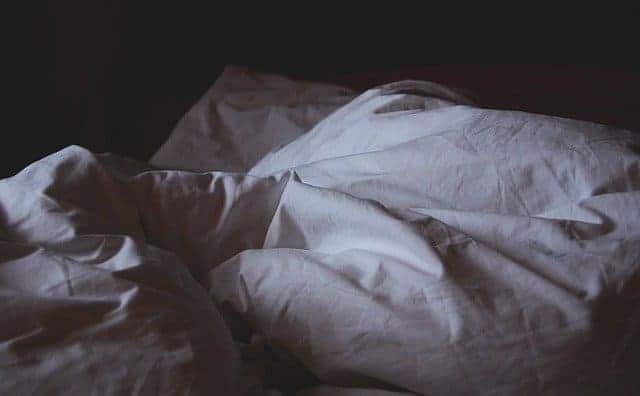Everyone sweats, and sweating is an essential physiological process of the body. Also known as perspiration, sweating is the body’s natural way of regulating its temperature. Sweat contains water that brings about a cooling effect when released over the skin. You expect to sweat on a hot day when working out or doing some hard work. However, it’s alarming when you regularly start sweating at night. Excessive sweating while sleeping or night sweats is not normal.
So how can you tell that you sweat excessively at night?
The first telltale sign is waking up to soaking wet nightwear and bedsheets. Sometimes the situation is so bad that you have to use a mackintosh sheet to protect your mattress. But don’t confuse it with the sweaty nights you experience during summer. Problematic night sweating is not only excessive, but it is also repeated.
With that in mind, the next question you’d ask is, “am I sick if I sweat in my sleep?” Many people have experienced excessive night sweating at some point in their lives. Research indicates that about 41% of average-aged men and women experience excessive sweating during the night. However, the good news is that it is now possible to rectify the problem and begin enjoying your sleep again. In this article, you’ll learn more about what causes night sweating, what to do about it, and potential symptoms that point out the need to see a doctor.
What Causes Night Sweats?
Many things do cause night sweating, but luckily most of them are not serious. However, repeated sweating might be an indication of an underlying medical condition. Here are some of the common causes of the night sweating.
1. Drinking alcohol before sleep
A little alcohol or wine at bedtime is a great way to induce heavy sleep. On the flip side, it may cause excessive sweating. So, how does alcohol trigger night sweating? When you drink, your heartbeat speeds up. This causes blood in your vessels to flow faster, which warms up the skin and subsequently triggers sweating. Besides that, alcohol tends to relax the nasal cavity muscles, making you breathe harder or snore. When this happens, your body temperature will increase, and you’ll begin to sweat to cool off the body.
2. High stress and anxiety levels

Stress and anxiety cause a lot more harm to the body than the usual panic and fear that many people know about. When you’re experiencing these mental issues, your mind is overworked. This triggers the production of several stress responses, including a concomitant increase in body temperature, heart rate, and metabolism. All these factors are associated with excess sweating. If you’ve been experiencing panic attacks and nightmares, you are likely to start sweating at night as a response to these symptoms.
3. Menopause
It is said that life begins well at 40 for women. But, it brings with it a host of challenges. One of them is excessive sweating while sleeping. And so you’d ask, “why should I start to sweat in my sleep after my 40th birthday?” The question is answered by Dr. Aarthi Ram, neurologist and sleep medicine expert at Houston Methodist. You are at the menopausal or perimenopausal stage of your life. At this stage in life, there is a lot of hormonal activity going on, which triggers myriad symptoms, including hot flashes.
Hot flashes are the hallmark of the premenopausal stage, affecting over 75% of women. They are regarded as the critical drivers of the night sweating in women between the ages of 45 and 55 years.
4. Sleep environment and nightwear
Everyone likes a warm and cozy bedroom. However, an overheated room is a perfect environment for night sweating. When your bedroom is overly hot, your body will overheat and, in turn, begin to sweat – this is a no-brainer. At the peak of winter, you’ll be tempted to cover yourself with the heaviest duvet and wear your warmest pajamas. If you do this, you are likely to wake up to a soaked bed. Besides that, a mattress that’s not well aerated can increase temperatures between your bedsheets.
5. Some medications
Some medications can induce night sweating. They include drugs used to treat hypoglycemia, hypertension, hormonal imbalance, antiretrovirals, antidepressants, and steroids. According to research, these medications affect the brain’s part that controls temperature regulation and sweat production.
6. Sweat disorder
Sweating disorder, also known as hyperhidrosis, is a chronic condition that involves the overproduction of sweat. Luckily, the condition is incredibly rare. There are two types of hyperhidrosis or excessive sweating: primary and secondary. In primary hyperhidrosis, the cause of the excessive sweating isn’t known, and it only occurs when you’re awake. On the other hand, the cause of sweating in secondary hyperhidrosis is triggered by medication or an underlying medical issue. Secondary hyperhidrosis is the one linked to night sweating since it mainly occurs at night.
7. Infections and other medical conditions
You have likely experienced an infection at one point in your life. And you know that infections are characterized by fever. These infections include HIV/AIDS, brucellosis, and tuberculosis. Other diseases that might cause spiking of your body temperature include rheumatoid arthritis, neurological disorders, cardiovascular diseases, cancer, and hormonal disorders.

What to Do About Night Sweats?
Typically, the right approach to treat your night sweating will depend on the underlying cause. The first step you need to take when you suspect a sweating problem is to visit your doctor. They will diagnose the problem and recommend one or a few of the following treatment options:
- Avoidance of triggers: If your night sweating is triggered by spicy foods, alcohol, caffeine, or drugs, you’ll be required to make the necessary steps to avoid these triggers. More importantly, you’ll need to stop taking these substances before going to sleep.
- Change of sleeping environment: Even if the weather is chilling, don’t overdress while sleeping. Use breathable beddings and sleepwear made from natural fabric. It’s also advisable to invest in a fan or air-conditioning system in your bedroom.
- Exercise and meditation: Doing this before going to bed will help your mind relax and focus, mostly if you have a mental issue.
- Adjust dosage or change your medication: If you are sweating excessively due to medication, your doctor might give you alternative drugs or adjust the dosage.
- Hormonal therapy: This will help to reduce the frequencies of hot flashes during menopause and, in so doing, minimize night sweating.
- Treat the underlying medical condition: If the sweating results from an underlying illness, your physician will recommend a treatment plan for it. This means alleviation of the symptoms, including night sweating.
Is Night Sweating Dangerous, and Should I See a Doctor?
You shouldn’t worry if the night sweating occurs once in a while. However, if it is persistent, interrupts your sleep, and doesn’t resolve with home remedies, you need to see a doctor. Additionally, sweating that’s accompanied by the following symptoms needs the attention of a doctor:
- Stomach pain and diarrhea
- Bloody or chronic cough
- Localized aches and pain
- Unexplained weight loss
- Chills and high fever
Be sure to mention all these symptoms to your doctor. They will get to the bottom of the problem and hopefully find the right treatment for you.
Nearly everyone has experienced an episode of sweating while sleeping at some point in life. It’s a common phenomenon that shouldn’t worry you much. Even so, you should be concerned if the sweating persists longer than expected, seems to interfere with your sleep, or is accompanied by other symptoms. In that case, you need to see a doctor.
Night sweats can be caused by several factors, including alcohol intake before bed, medication, sweat disorder, hormonal disorders, menopause, medical illnesses, stress, and even poor sleeping habits. When you seek medical help, your doctor will diagnose the problem and unearth the root cause of your excessive sweating at night. They’ll then give the right recommendations based on the diagnosis.
But, as you seek any intervention, remember that night sweating is treatable.
